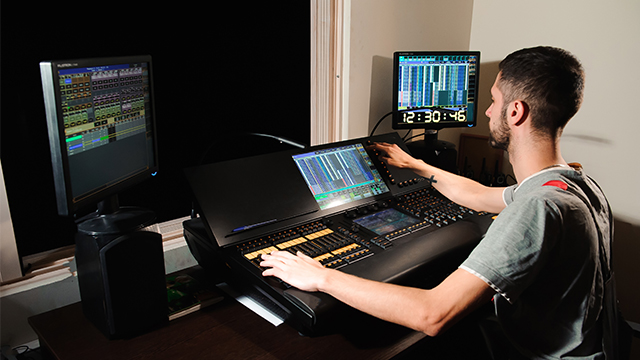Technical Theatre Roles Every Actor Should Fill (At Least Once)
Written by Ashleigh Gardner
April 13, 2017
As performers, we love being in the spotlight — but we also have to remember that if it wasn’t for a technician, there would be no spotlight. Actually, there would be no lights at all. No set. No sound. No costumes. No props. No organization. That’s why it’s important that, at least once, we step into the shoes of our technician friends to see exactly what kind of work they go through when they create something for a production. Sometimes, their jobs can be thankless because the audience doesn’t see them — and that’s one way to know they’re doing what they do best — unseen, unheard, and unbelievably talented at making a production seamless. When you experience what it’s like to be a technician, you can further appreciate the work they do.
1. Spot op.

There’s nothing like being a spot op in the rear or the top of the theatre. When actors, singers, and dancers are bounding about the stage, it’s difficult to keep a mark on them while maneuvering a heavy instrument on wheels. Spot ops have strength, good aim, and great focus and concentration.
2. Costume technician.

When actors go in for their first, fifth, or fourteenth costume fitting, there’s always a technician to take notes, measurements, and orders from the costume designer. Sometimes, if an actor has a complaint, they’ll throw it out, and the costume designer and technician might bear the brunt of some rudeness. A keen attention to detail, confidence (in standing up for the design), and organization are all challenges that a costume technician masters when dealing with wardrobe problems. They also must have patience when they must continually repair costumes night after night if an actor isn’t careful while doing that high kick during the second act number.
3. Prop runner.

Talk about quick. Prop runners must deftly hand props and hand-held costume pieces to actors just in time for their entrance. They’re organized, calm, and attentive. What’s more, they have to make sure it’s the right prop for the right scene in the right character’s hands. If the stage manager or prop master doesn’t do it, prop runners will make a detailed grid with everyone’s scenes and props listed to keep the rotation of props organized.
4. Construction hand or set painter.

There’s nothing like the smell of fresh cut wood on a Monday morning, and construction hands are adept at following precise measurements, using dangerous power tools, and doing, you guessed it — MATH. Set painters are masters of the paintbrush, creating antique wood floors from plain concrete slabs, marble benches from plywood, and aged exteriors of Victorian homes (to name a few). Their creative and strategic brains bring the director’s wishes to life.
5. Sound board operator.

If there’s a show that requires copious amounts of sound cues, count on a sound board operator to catch the cue and hit “go” at the perfect moment. They’re attentive to the action onstage, patient, and adaptive — sometimes sound boards (and lighting boards) forget their programming, and operators must be flexible and reconfigure their cues at the drop of a hat.
6. Stage manager or assistant stage manager.

This is the big one. There is no one under more stress and pressure than a stage manager. They keep detailed prompt books, have the responsibility of contacting late arrivals or no shows, keep the rehearsal on schedule, and are responsible for giving line notes for every rehearsal. They call cues backstage and must make tough decisions if a mistake happens. Once the show starts, the stage manager is in charge, and their skill at handling situations under pressure is unmatched.
Need some advice? We’ve got you covered.
- 10 Secrets No One Tells You About Audition for a Musical Theatre Program
- When You’re Not Into Acting, But You’re Still Into Theatre, Part 1
- When You’re Not Into Acting, But You’re Still Into Theatre, Part 2
- 5 Advantages of Having a Tertiary Role
- 5 Reasons You Shouldn’t Let a Bad Audition Define You
- 5 Tips for Nailing Your College Music Theatre Audition
- 10 Tips on Owning the Room at Competition
- How to Balance Theatre and Coursework
- The 10 Secrets of Great Understudying
- 10 Items Every Actor Should Carry in Their Rehearsal Bag
- 10 Items Every Dancer Should Keep in Their Rehearsal Bag
- 10 Remedies to Help Your Throat Survive Audition Season
